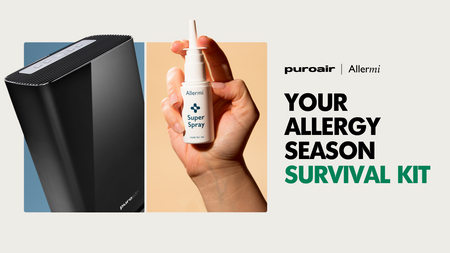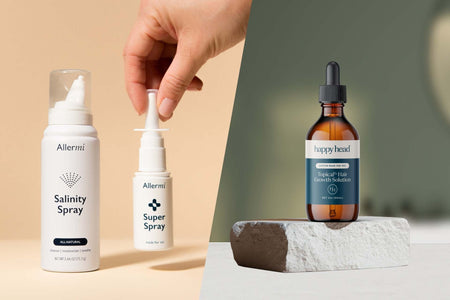Founder and Stanford Allergist, Dr. Bocian, answers all your questions from our Reddit AMA. Read on to hear what our members asked when it came to supporting their everyday struggles with allergies, the breakdown of OTC medications, and more!
I just wanted to thank you. Your product was one of the first nasal sprays I found relief with. I also learned the bunny sniff method which I had never been taught before. My question is why did I never find relief before from what doctors prescribe (Like Flonase or Nasonex)? An allergy test revealed I was allergic to almost everything, are those tests accurate?
I am very pleased to hear you are doing well with Allermi! There are many possible reasons that Allermi works in superior fashion to Flonase or Nasonex alone. To name just two, Allermi contains a micro-dosage of decongestant, that, with regular use, progressively improves the access of the anti-inflammatory and antihistamine components of your formula to the higher and deeper reaches of the nasal passages. Secondly, Flonase, which remains very popular in the American market, contains a preservative and solvent alcohol, that I have found to be irritating to the nasal passages in several ways. To your question about allergy testing, a great deal rides on which entities were tested, how they were tested, and how the skin test responses were interpreted. Allergy testing tends to have a non-trivial false positive rate and generally a lesser false-negative rate. The interpretation of the testing and what is done with the data is both art and science. There are many patients who indeed have bonafide allergy to every allergen that is tested on a testing panel, and there are others for whom the results might be over-interpreted or might be false positives.
Why do my allergies flare up in the Summer? Isn't allergy season mainly in the Spring?
While spring is often associated with allergies due the abundance of tree pollen, allergies can occur at any time of the year, depending on the specific allergens one is sensitive to. If one is allergic to to grasses, which primarily bloom and pollinate in the summer, allergic symptoms in the summer can be quite severe. One who is allergic to mold spores might experience symptoms during the summer if he or she lives in a more humid area. You may benefit from allergy testing to identify your allergic triggers.
I've been taking Afrin for the last few years and a bunch of other OTC medications, how can I get off of it and not be dependent on it?
While a sudden withdrawal of all oxymetazoline might eventually re-set the nasal lining to a non-rebound state, doing so is likely to be extremely uncomfortable due to the high degree of congestion that is likely to take place. We favor usage of a micro-dose of oxymetazoline, which should be effective in controlling congestion and at the very same time, employing topical anti-inflammatory medications that are intended to control inflammation of the nasal lining, which is the fundamental cause of congestion in the first place.
What are factors that contribute to post nasal drip? What are the best ways to get rid of it? I love my Allermi spray, I’m just noticing with the season change that my post nasal drip is getting worse. It’s been the worst symptom of my allergies for as long as I can remember and ends up contributing to a chronic cough when it gets bad enough.
Post-nasal drip is a symptom of inflammation. When nasal mucosal tissue becomes inflamed, it produces an excess of mucus, as a defense mechanism against what the body perceives as invaders, i.e., allergens or viruses. To help improve your post-nasal drip, please stay consistent with your Allermi Super Spray as prescribed to reduce inflammation. If your post-nasal drip continues to get worse, your Allermi care team can adjust your formula to either increase the anti-inflammatory component, or add/increase a medication called ipratropium that targets excess mucus.
Please also increase your Salinity Spray use. This helps excess mucus thin and drain. To do so:
- Insert the Salinity Spray nozzle as deep as comfortable
- Leaning over the sink, sniff up 5 sprays of Salinity Spray in each nostril
- Then gently blow your nose
- Repeat this saline-then-nose-blowing cycle several times
- Then use Super Spray
Since your post-nasal drip is causing cough, you may benefit from sleeping on an incline using bed risers to elevate just the head of your bed or a wedge pillow. Both of these items are available online. (We don't advise using pillows to prop you up instead, as this can worsen symptoms - you want a gradual, smooth incline). This helps nighttime post-nasal drip drain more easily and can help reduce cough.
My question is; can one really cure allergies? For context, I had allergy shots for 2 years back when I was a teenager and barely had any symptoms (coughing, throat feeling tight, itchy eyes) for a long time afterwards. I thought that was the cure and the end of it. Eventually symptoms started coming back slowly and in various different forms than before.
With respect to allergies, we speak not of cure, but of varying degrees of control. The 3 main pillars on which allergy treatment stands are environmental-allergen control (i.e., reducing exposure), which can be informed by allergy testing; allergy medications that address the fundamental issue, which is allergic inflammation, and allergy medications that provide acute symptom relief; and, allergy immunotherapy, addresses allergy at the most fundamental level, which is at the point at which the allergic response is generated by the immune system in the bone marrow and lymph nodes. At times, immunotherapy either has to be revised according to updated allergy testing, or needs to be continued either long-term or in perpetuity, in order to achieve consistent control of symptoms.
How does one suddenly become allergic to something as an adult? A few years ago we went to dinner and my brother ordered crab legs and his whole mouth swelled up, he was 35 years old at the time and had never had that happen before.
We do not know yet how an allergy can suddenly surface. But what we do know is that before the symptoms became outwardly manifest, a length of time passed during which "silent" allergic sensitization was taking place in the body, from earlier exposures to crustaceans. It is quite common that shellfish allergy can arise in adulthood, and often the realization that such allergy has come to the picture is sudden. When one discovers an allergy to crab, one must be equally cautious with respect to consumption of shrimp, lobster and crayfish, since the crustaceans share the major allergen protein.
Allergy testing should be done as soon as feasible, either by skin-testing or a blood test. It is usually important to also test the mollusk category of shellfish (mussel, oyster, scallop, clam, squid, octopus), since there is a higher incidence of allergy to the mollusks when one has allergy to the crustaceans.
Likewise, it is important to ascertain if allergy to finned fish could also be present. Such allergy is not necessarily permanent once it is established, and can often disappear after a period of complete avoidance of the relevant seafood category - the length of time during which reversal of the allergy might take place is very difficult to predict. Finally, if a food allergy is established, it is important to have a prescription for an epinephrine auto-injector such as the EpiPen in the event that inadvertent or accidental injection of the food allergen triggers moderate to severe reactivity in the oral airway. I would recommend consulting with an allergist about this as soon as feasible.
Are there tests that can determine if you are allergic to a particular food item?
Yes, the selection of particular allergens to test, as well as the testing modality (skin test, blood test and/or supervised oral-ingestion food challenge) is best guided by your specific medical history. Meaning, your allergist will need to interview you and determine what the pattern of symptoms has been in relation to the ingestion of specific foods. We would recommend against "food sensitivity" tests, which are available from many online sources and which usually are based on a scientifically-invalid premise.
Read more from our Reddit AMA with Dr.Bocian here.








